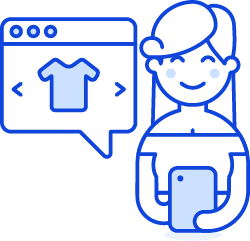Why every company should have its own website

Having a website has become indispensable for every company, even if you only run a one-man business or a simple shop. With your website, you can attract new customers, improve your services (and thus boost your sales!) or create a platform for both customers and staff as part of your business processes. Here are a few of the benefits of having your own website.
Download our e-book on how to build a website
Your website helps you attract new customers
 All too often, companies and entrepreneurs believe that they do not really need a website. They only sell offline or have enough customers, so why would such a website be of any use? This belief, however, is wrong. Because with your website, you can attract new customers.
All too often, companies and entrepreneurs believe that they do not really need a website. They only sell offline or have enough customers, so why would such a website be of any use? This belief, however, is wrong. Because with your website, you can attract new customers.
This is necessary to boost your sales, but also to ensure that your existing customer base remains stable. Without any efforts on your part, your customer base is likely to shrink, due to turnover or ageing. In order to survive, you need new customers to have sufficient sales to keep your business healthy.
In the past, it was much easier to attract new customers through word-of-mouth advertising. But now, your customers are online, and that is where you have to approach them if you do not want to be overwhelmed by the competition. Having your own website has actually become a necessity in order to survive!
What is more, nowadays, your company will not come across as believable if it has no online presence. Even if only with a basic website – an online business card, as it were. A website is a sign of professionalism. These days, you can no longer do business with a contractor if you cannot find references about it online.
Today, people always search for information using search engines such as Google before visiting a shop. Even if only to check its opening hours, address or telephone number.
Imagine that someone is looking for a construction company specialising in the hospitality industry, preferably in your area. When that person enters these keywords in Google, he or she will get a list of names, with the possibility to click through to the corresponding websites. But if you do not have a website, you will be missing a potential customer here, because you are invisible online. On the other hand, if you have your own website (and the right SEO strategy), that person will be able to find out more about your company almost immediately.
Tip: Online tools like Combell's SiteBuilder allow you to create your own website in no time at all, for little money, whether you want a simple business card or a fully functional web store. No more excuses for not having a website!
Showcasing your products and/or services on your website
 Your own website is often the first contact point with your potential customers, and therefore offers you the opportunity to promote your range of products and/or services. You can explain the differences between your approach and that of your competitors, and use reviews to prove that you are worthy of the trust that your customers place in you. And beautiful pictures will help you showcase your products and projects you have already completed, take a peek inside your shop, and so much more.
Your own website is often the first contact point with your potential customers, and therefore offers you the opportunity to promote your range of products and/or services. You can explain the differences between your approach and that of your competitors, and use reviews to prove that you are worthy of the trust that your customers place in you. And beautiful pictures will help you showcase your products and projects you have already completed, take a peek inside your shop, and so much more.
In addition, your website is accessible at all times. Day and night, including Sundays and public holidays, your client can pay a virtual visit to your shop, see what you have to offer, book a table in your restaurant or request a quote via a web form.
A website provides an extra service to your customers
A website is also a great way to pamper your existing customers. You can e.g. allow them to download menus for special occasions, or to make online appointments with a hairdresser, a beautician, etc. As for large companies, they can make things much easier for their customers by allowing them to submit their orders via a B2B customer portal.
Example for a butcher: you regularly create special takeaway menus (on public holidays, for barbecues, etc.). Then, of course, you can wait until your usual customers take your leaflet home with them when making their everyday purchases. But if you have your own website, you can publish the menus online well in advance, so that your customers can make their choice and place their order in the comfort of their own home.
Example for a hairdresser: not only can you put your rates and opening hours on your website, but you can also use a special module to allow customers to make an appointment themselves on a specific day. This is much easier for the customers, but also for yourself, because your work is no longer constantly interrupted by phone calls. Just think of the time you will save!
On your website, you are in charge!
 Companies often believe that a Facebook page is a good alternative to a website. But that is wrong too. Because on that page, you do not have full control over what is happening. Of course, your presence on social networks is a great, interactive way to communicate with your existing customers. But you have no control over the 'flow' that visitors go through on your website in order to pique their interest and win them over.
Companies often believe that a Facebook page is a good alternative to a website. But that is wrong too. Because on that page, you do not have full control over what is happening. Of course, your presence on social networks is a great, interactive way to communicate with your existing customers. But you have no control over the 'flow' that visitors go through on your website in order to pique their interest and win them over.
With your own website, you can fine-tune your customer journey. You can win over your (potential) customers using beautiful pictures of e.g. the dishes they can order in your restaurant. And then, you just have to guide them to a form, where they can book a table.
Now that you understand why you need to have your own website, you can download "Build your own website". In this e-book, we will take you through the different steps involved in creating your own website, and explain how you can get started.
